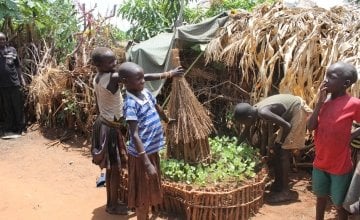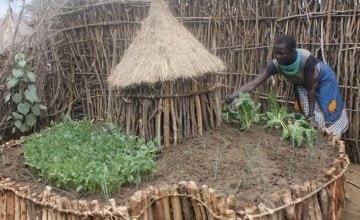
Read our 2023 annual report

Knowledge Hub
Keyhole gardens: a solution to malnutrition in Uganda

The Nepak District of Uganda faces high rates of malnutrition however, keyhole gardens are sprouting up across the landscape, offering local communities an escape from malnutrition.
A keyhole garden – named for its shape – is a round, raised, stone fenced plot with a section cut out in the middle to enable access to a composting basket.
Keyhole gardens are made from low-cost, locally available materials and require less labour and water than regular vegetable gardens. Their structure ensures soil fertility for five to seven years and they can grow at least five varieties of vegetables at a time, providing dietary diversity at a lower cost. These innovative raised gardens are fertilised by kitchen waste and designed to thrive in difficult conditions.
How keyhole gardens work
Families can use everyday kitchen and garden waste to nourish their keyhole garden, eliminating the need for costly fertilisers and pesticides. The nutrients and water in the compost increase a garden’s resistance to drought, enabling it to produce food year-round.
Last year, Concern piloted an initiative to help families construct their own keyhole gardens in Uganda — and already 10,000 gardens have sprouted up across the landscape.
Restored confidence through keyhole gardens
Agnes lives with her family in Karamoja village in the Nepak district of Uganda. She travels a long distance to a neighbouring district to try to find work and until recently, she worried about leaving her children at home with no food to eat. Now, thanks to the Concern keyhole garden programme, Agnes feel confident leaving her children at home, as there is plenty of food to eat and they are happy to prepare it themselves.
“My children are able to harvest eboo (cow-peas), onions and sukumawiki (local greens) directly from the keyhole garden and cook them.”

Enhanced nourishment and peace of mind
Beredetta, a mother also from Karamoja village, harvested six rotations of vegetables from her keyhole garden. In addition to being able to feed her family from this harvest, Beredetta was able to sell her excess vegetables at the local market for 30,000 Ugandan shillings – approximately US$10. The money has enabled her to buy books for her children, as well as seeds, salt, soap, and cooking oil. Beredatta takes great pride in her garden, and in the varied, healthy diet she is now able to provide her children.
Long-term economic and health benefits
Many households harvest vegetables from the keyhole gardens at least three times over a three-month period. In addition to the staples of cow-peas and local greens, some keyhole gardens feature tomatoes, onions, carrots, and aubergines.
The harvested vegetables are mainly used for household consumption, while the surplus is either dried and stored for future consumption or sold in the nearby market. For the first time, families are experiencing the benefits of having fast-yielding vegetables available for their children and households during both the wet and dry seasons.
Keyhole gardens are flourishing in the Napak district, changing the landscape and opening a path away from malnutrition for the rural poor. The success of this innovative practice is a testament to the determination of the most vulnerable people in Uganda to take action against malnutrition and stunting. Concern hopes that keyhole gardens will continue to help combat malnutrition by sustainably increasing access to nutritious foods in north-eastern Uganda.
Learn more about our work


